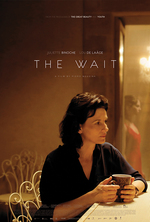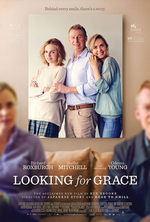Film Screening 11th November, 2016

The Wait (L’attesa)
7:30 PM, 11th November, 2016
- M
- 99 mins
- 2015
- Piero Messina
- Giacomo Bendotti, Ilaria Macchia, Andrea Paolo Massara, Piero Messina
- Juliette Binoche, Lou de Laâge, Giorgio Colangeli, Domenico Diele
A highlight of every French Film Festival is the regular Juliette Binoche entry (and it is always a disappointment if she doesn’t show up in anything). Binoche is such a beautiful and skillful actor that you know you are in for something special with each role she takes on. (I described her, in a recent ANUFG review for Camille Claudel 1915 as “able to tell a million stories in simple and brief rearrangements of her facial muscles”.)
Well, The Wait was the 2016 entry, and she is again the main reason to see this film (although director Piero Messina, in his feature debut, has certainly learnt an impressive set of skills from his assistant director role on Paolo Sorrentino film like The Great Beauty).
It revolves around two women – a mother and a girlfriend – both waiting for the return of Guiseppe for Easter. They are thrown together in a beautiful Sicilian town, and it soon becomes apparent that there are secrets to decipher from the small clues being thrown our way by both women.
This is a slow and reflective movie, and will be most appreciated in silence (so, more than usual, make sure turn off your mobile device!). It has a haunting quality that lingers long after the end credits so, if this sounds like your cup of tea, then don’t miss The Wait.
Travis Cragg

Looking for Grace
9:19 PM, 11th November, 2016
- M
- 101 mins
- 2015
- Sue Brooks
- Sue Brooks
- Radha Mitchell, Richard Roxburgh, Odessa Young, Terry Norris
The fifth feature from critically-acclaimed Australian filmmaker Sue Brooks (behind national gems Japanese Story and Road to Nhill), Looking for Grace offers a keenly-observed portrait of family life and its complexities. Although mapped on the familiar plot terrain of runaway youth, Brooks’ wry humour and non-linear approach elevates the film beyond the conventional coming-of-age drama.
In short: the spirited Grace (played by up-and-coming Odessa Young), with friend Sappho in tow, embarks on a journey across the Western Australian border to see rock band Death Dog perform. The catch: the expedition is unknown to her self-absorbed parents (Mitchell and Roxburgh) and Grace, literally gambling with their trust, funds it on cash stolen from her father’s safe.
As the chase for Grace tests the unsteady ties between daughter and parents, its multi-point character narration (delivered through intertitled chapters) introduces the idiosyncratic small-town inhabitants through brittle social satire. Arguably, the most memorable performance comes from Terry Norris, playing the private eye Tom, whose hard-edged humour cuts through the denser drama explored between friends and family.
The cinematography by Katie Milwright is brilliantly executed; the tightly-composed interior shots suffuses domestic scenes with a claustrophobic intensity, while the sprawling desert landscape echoes the vacuous nature of many of the flawed characters. Powerfully told, Brooks’s masterful study of relationships and consequences provides an intense piece of cinema that, as aptly-put by Margaret Pomeranz, “gets to the minutiae of being human.”
Alexandra Stewart